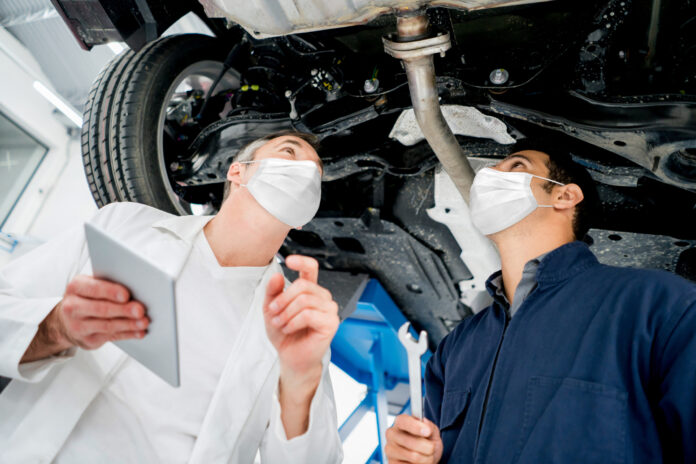
The COVID-19 pandemic, an unprecedented global crisis that emerged in early 2020, has had profound and dynamic consequences across industries. In the realm of automotive manufacturing and dealerships, the impact has been far-reaching and continually evolving. In this article, we explore the multifaceted repercussions of COVID-19 on the automotive industry.
Supply Chain Disruptions: A Global Challenge
The pandemic delivered an immediate and seismic shock to the automotive industry’s supply chains. With components and parts sourced globally, manufacturers faced a challenging landscape as lockdowns and disruptions in various regions caused delays, shortages, and even factory closures.
The disruption reverberated across continents, with the virus’s global spread causing supply chain interruptions that rippled from Asia to North America and beyond. Notably, the ongoing semiconductor chip shortage played a pivotal role in exacerbating these disruptions, impacting everything from vehicle production to in-car technology.
The Infamous Semiconductor Chip Shortage
The semiconductor chip shortage, intensified by the pandemic, became emblematic of the supply chain challenges faced by the automotive industry. These tiny chips, essential for various vehicle functions, suddenly found themselves in high demand for consumer electronics and medical devices, further straining their availability.
Manufacturers worldwide found themselves in a race to secure these vital components, with production lines idling as chip shortages persisted. The shortage exposed the industry’s vulnerability to disruptions in an increasingly interconnected and tech-dependent world.
Impact on Consumer Prices and Choices
As supply chain disruptions and chip shortages persisted, consumers began to feel the impact. New car prices surged due to limited availability, prompting some buyers to turn to the used car market. This, in turn, drove up prices for pre-owned vehicles to unprecedented levels, making it challenging for many to afford even previously affordable options.
The combination of limited supply, increased demand, and rising prices led to a dynamic shift in consumer choices. People began exploring alternatives like electric vehicles (EVs), which were less affected by chip shortages, and reconsidered their vehicle ownership patterns.
Ongoing Challenges
As the pandemic’s initial shockwaves subside, the industry still grapples with sourcing critical components. The enduring challenge of securing a stable supply chain underscores the need for resilient and flexible systems capable of navigating unforeseen crises, including chip shortages and other global disruptions.
In an era where technology and automotive manufacturing intersect more than ever before, the industry faces the task of reevaluating its approach to supply chain management. Collaboration, innovation, and adaptability will be the cornerstones of resilience as the automotive sector charts its course in a world forever changed by the challenges of COVID-19.
Production Halts: A Pause in the Assembly Line
Safeguarding the Workforce
To prioritize the safety of their workforce and adhere to government mandates, many automotive manufacturers temporarily halted production. These decisions had far-reaching consequences, affecting not only the industry but also the broader economy.
Gradual Recovery
Resuming production was a gradual process, marked by the implementation of stringent safety protocols and social distancing measures. The phased approach slowed the recovery, adding financial strain to manufacturers and affecting employment.
Shifting Consumer Preferences: A New Road Ahead
The pandemic also altered consumer preferences and behaviors. Lockdowns and health concerns prompted many people to reconsider their transportation needs. Public transportation ridership declined as individuals sought more isolated and safer modes of travel. This shift in demand led to increased interest in personal vehicles, including used cars, as people sought alternatives to crowded buses and trains.
Additionally, remote work and virtual meetings reduced the need for daily commutes, causing some to delay or reconsider their vehicle purchases. In response, automakers adjusted their product offerings to align with the changing landscape, emphasizing safety features, sustainable manufacturing practices, and in-car technology.
Digitalization Accelerated: A Virtual Automotive World
The automotive industry has been gradually moving towards digitalization, but the pandemic accelerated this process. Dealerships and manufacturers had to adapt quickly to shifting consumer preferences. As a result, digital platforms became the primary means for car shopping, test drives, and even finalizing purchases.
Virtual showrooms and contactless transactions became the norm. Dealerships invested in online sales infrastructure and adopted digital marketing strategies to reach customers effectively. This transformation underscored the importance of a strong online presence for both manufacturers and dealerships.
Financial Impact and Recovery
The financial implications of the pandemic on automotive manufacturing and dealerships were significant. Many companies faced reduced revenues, increased expenses related to health and safety measures, and liquidity challenges. Governments in various countries implemented stimulus packages and financial assistance programs to help the industry weather the storm.
The recovery process has been gradual and uneven across regions. While some markets have rebounded quickly, others continue to grapple with uncertainties and challenges. The industry’s future hinges on factors like vaccination rates, economic recovery, and ongoing supply chain stability.
Lessons from the Pandemic for the Auto Industry
The COVID-19 pandemic has had a profound and enduring impact on automotive manufacturing and dealerships. Supply chain disruptions, production halts, changing consumer preferences, accelerated digitalization, and financial challenges have reshaped the industry in numerous ways.
As the automotive sector continues to adapt to the evolving landscape, resilience and flexibility remain essential traits for manufacturers and dealerships alike. The lessons learned from the pandemic will undoubtedly shape the future of the industry, influencing everything from supply chain management to customer engagement strategies.




